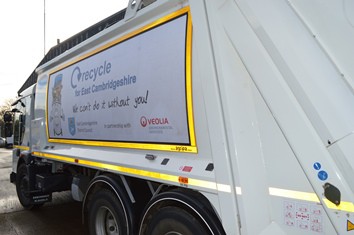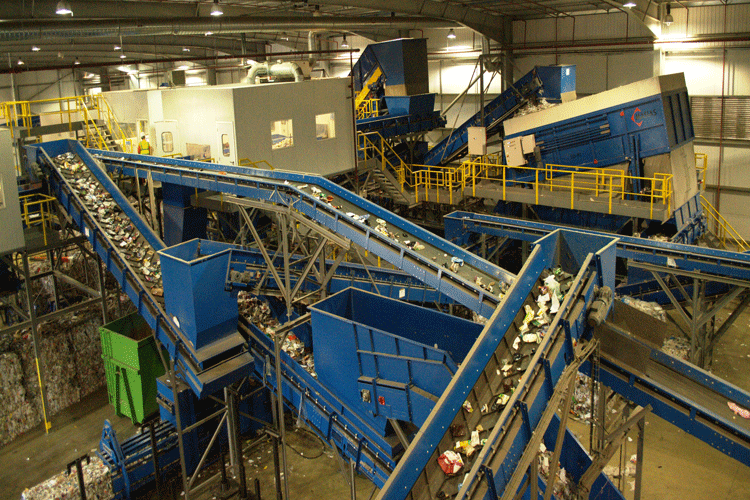But, just days ahead of its closure, Aylesford Newsprint last month expressed renewed concerns about used newspapers from the district, even though it used them to make newsprint.
Details have emerged of how the troubled Kent-based recycling mill had disputed East Cambridgeshire council’s TEEP assessment, claiming that commingled material which was processed at AmeyCespa’s Waterbeach MRF “does not meet our quality specification”.

Aylesford appointed administrators KPMG on February 23 (see letsrecycle.com story).
Prior to administrators being called in the company told letsrecycle.com of its disappointment regarding East Cambridgeshire’s conclusion, agreed on February 16 that its existing commingled service produced a suitable quality of recycled material. However, the authority has undertaken a detailed analysis and says material sales are similar to those routes achieved by kerbside separation.
The council’s assessment found that it would not be technically, environmentally and economically practicable (TEEP) to introduce separate kerbside collections in the region, and it therefore believes it has fulfilled requirements in the EU Waste Framework Directive in place since January 2015.
However, Aylesford said it disagreed with the TEEP assessment, claiming that it wasn’t currently accepting material from AmeyCespa’s nearby Waterbeach materials recycling facility (MRF) – which sorts East Cambridgeshire’s commingled recycling – as it did not meet the quality grade.
AmeyCespa holds a contract with the council to process commingled recycled material collected from households at its 100,000 tonnes per year capacity materials recycling facility (MRF) at nearby Waterbeach. Paper from this facility was sold to Aylesford Newsprint for further processing.
[testimonial id = “193” align=”right”]
Speaking prior to the mill closure, a spokeswoman for Aylesford told letsrecycle.com: “Aylesford Newsprint Ltd would like to clarify that the newspaper and magazine mix produced by the Ameycespa Waterbeach MRF does not meet our quality specification. It requires a further level of sorting over our own sort line and as such we downgrade this as a mixed paper grade. We currently don’t accept this material.
“We are aware that Ameycespa are due to embark on a MRF refit and hope that this will result in the production of a suitable newspaper and magazine grade.
“It is in everyone’s interest to ensure that material collected for recycling is of at least adequate quality and that it reaches the reprocessor in the most efficient way possible, as such we don’t agree with this element of the TEEP assessment.”
AmeyCespa
Responding to Aylesford Newsprint’s comments, AmeyCespa said the Waterbeach MRF used “state-of-the-art technology” to sort material from its local authority clients.
An AmeyCespa spokeswoman said: “The MRF takes materials from a variety of sources and the material can vary in quality which affects the output. We are investing in improvements to our MRF technology, which will improve extraction rates and increase the quality of material produced.”
East Cambridgeshire
It is not the first time the paper recycler has been at loggerheads with East Cambridgeshire council on the issue. In January 2014, Aylesford’s then-managing director Ian Broxup said that collecting paper and glass together is “akin to vandalism”, as it damaged re-processing machinery as well as contaminating paper material (see letsrecycle.com story).

According to the council’s TEEP assessment, completed using the April 2014 Waste Regulations Route Map, around 45% of East Cambridgeshire’s paper was sold to Aylesford mainly as news & pams grade, but some as mixed paper.
Figures show that from January to October 2014, East Cambridgeshire supplied Aylesford with 5,230 tonnes of news and pams material and 239 tonnes of mixed paper.
The council report also states that paper is “considered the most contamination sensitive material collected” and that its high-grade use by Aylesford for newsprint manufacture means it is “not necessary to collect materials separately to achieve good quality recyclable material”.
The authority’s TEEP assessment states: “Reprocessors are made aware of contamination levels prior to accepting materials, & legitimate recycling outlets have been found for all materials produced. Much of the paper collected continues to be provided to Aylesford Newsprint Limited for high quality use in newsprint manufacture, and all glass is used to produce container glass, rather than being sent for lower level use as aggregate.
“These uses are the same as when the council collected materials separately, suggesting that the quality of material has been maintained through comingled collections. The council does not, therefore, consider it necessary to collect materials separately to ‘meet the necessary quality standards for the relevant recycling sectors’.”
The council’s current recycling collection contract is due to end in March 2018, although there is the option for a further one year extension. Should the contract be extended, however, the report states that it “would be necessary for the implications of TEEP to be considered”.
East Cambridgeshire had been one of the first English council’s to attempt to justify commingled recycling collections by interpreting TEEP guidelines in a report in December 2013 (see letsrecycle.com story).










Subscribe for free